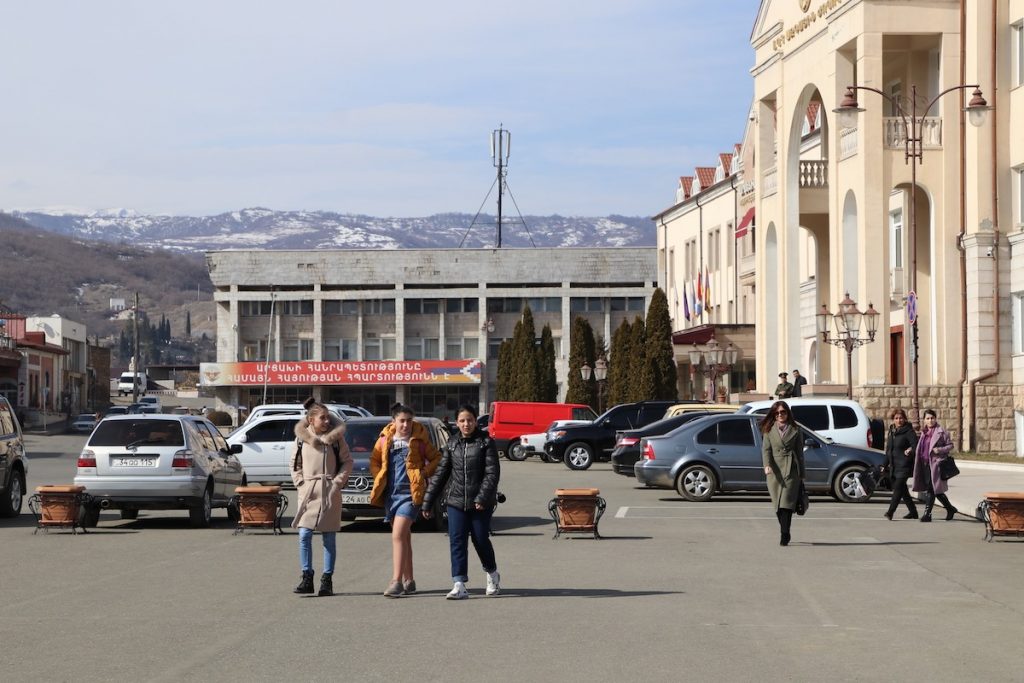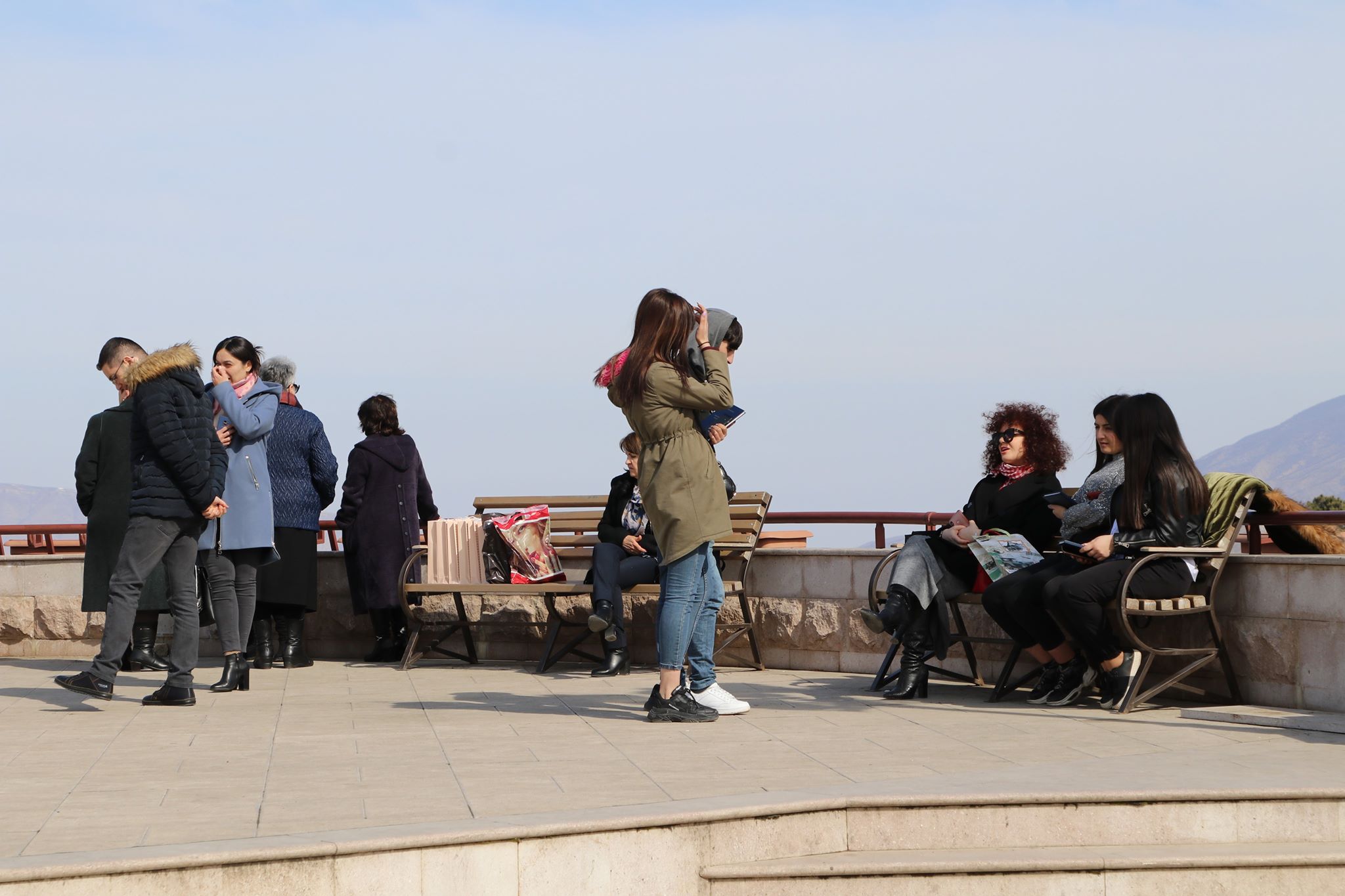Karabakh to hold 2nd round of presidential elections despite coronavirus outbreak
Emergency provisions have been introduced in Nagorno-Karabakh to counter the spread of coronavirus, however the second round of the presidential election scheduled for April 14 will still take place.
The authorities claim that they will ensure compliance with hygiene standards at polling stations.
This JAMnews article on the pre-election situation was published when the first coronavirus infected appeared in Nagorno-Karabakh. On April 12, 5 people were found to have contracted the coronavirus.

Despite the confirmed cases of coronavirus in Nagorno-Karabakh, the authorities will apparently not postpone the second round of the presidential elections, which is scheduled for April 14. However, many local residents and politicians, including one presidential candidate, are demanding that they reconsider.
Other politicians suggest that the government consider other options, including starting the process of creating a federal state with Armenia.
- Nagorno-Karabakh to elect new president and parliament despite coronavirus
- Armenian PM at UN General Assembly: “Karabakh will not be part of Azerbaijan”
Coronavirus in Karabakh
On April 9, two new cases of coronavirus were reported in Nagorno-Karabakh, bringing the total number to three. This was announced by the Nagorno-Karabakh Minister of Health on his Facebook page. .
One of the new cases was a relative of the first person to be infected in the area, who has been in self-isolation since April 2. The third patient is an Armenian citizen who came to Nagorno-Karabakh.
The first case of infection in the area was detected on April 7 in a 60-year-old resident of the village of Mirik, Kashatagh district. The whole village where he lives, about 40 families, is now quarantined.
After new cases were discovered, President of Artsakh (the republic’s own name for Nagorno-Karabakh) Bako Sahakyan ordered that entry into the republic from Armenia be more tightly controlled, although an entry ban had already been established on April 3.
Judging by discussions on social networks, many in Karabakh still have hope that the authorities will declare a state of emergency and postpone the election.

Election violations on March 31
The first round of presidential elections and parliamentary elections were held in Nagorno-Karabakh on March 31. There was already a risk of spreading the epidemic, but the elections were not canceled, as the border with Armenia, where the number of infected people was increasing, had already been closed.
These elections held a particular importance. In 2017, a new constitution was adopted in Karabakh, according to which a republic that is not recognized by any other nation should move from a semi-presidential to a presidential form of government.
So the president who is currently being elected will have significantly more powers than his predecessors.
Armenia declared a state of emergency on March 16 to counter the epidemic, and many people called to postpone the elections in Karabakh. This request was also voiced by 6 out of 14 presidential candidates, including the Minister of Foreign Affairs, Masis Mayilyan.
But the Karabakh authorities ignored these requests. Voter turnout was high, at around 76 percent.
After the parliamentary election, five parties had new MPs – Free Homeland, United Homeland, Justice, ARF Dashnaktsutyun and the Democratic Party of Artsakh.
The Free Homeland Party, which is headed by former Prime Minister Arayik Harutyunyan, won 16 of the 33 free seats in parliament.
Arayik Harutyunyan himself one the largest portion of the presidential votes – 49,2%. In second place was Masis Mailyan (26,7%.).
They are both moving on to the second round of the elections, which is scheduled for April 14.
The elections caused mixed reactions in Armenian society. Even observers who arrived from Armenia, including those close to Armenian Prime Minister Nikol Pashinyan’s administration, spoke about numerous violations that cast doubt on the fairness of the elections.
Examples of violations include bribery, open ballot voting and photographing ballots.
The silence Arayik Harutyunyan and his party, who just one a majority of the parliament seats, on the issue suggests that these violations also worked to his benefit.
On the night of April 1, when the votes were first counted, Arayik Harutyunyan’s victory in the first round was announced with almost 57% of the vote. But in the afternoon, it became clear that he won only 49.2%, and that there would be a second round.
Arayik Harutyunyan did not dispute this glaring difference in numbers and did not demand a recount.
Experts say he fears a recount, and that the election will be recognized as unfair and cancelled, more than the second round of voting.
Protests
On April 7, a protest rally was held in Stepanakert. Several hundred people came and speakers complained of numerous violations during the election.
They also said that the authorities endangered people by insisting on holding elections during the epidemic.
On the same day, one of the participants of the second round, Masis Mailyan, released a statement. He called on his supporters to boycott the elections and not vote, for the sake of their own health.
Mayilyan did not withdraw his candidacy, because in this case, a third participant Vitaly Balasanyan, would have taken his place in the second round, and the elections would have taken place anyway.
The elections will most likely be held, even with a minimal turnout, especially since the law does not stipulate any restrictions on voter turnout.
People on social media call for a state of emergency and to postpone elections until October
Former Advisor to the Prime Minister of Armenia Arsen Kharatyan believes that the situation may be complicated due to the fact that the legislation is somewhat vague regarding the rules for imposing a state of emergency.
Paragraph 2 of Article 76 of the Nagorno-Karabakh Constitution states that “in case of emergency, elections and referenda will not be held.” But there is no indication of whether a second round of voting should be held.
“If a state of emergency is declared, it will be necessary to cancel the election results from March 31 and schedule new elections after the end of the state of emergency,” said Kharatyan.
He says that political forces in Armenia and Artsakh are currently consulting each other on the issue.
“Moving on to the second round is essentially a gamble,” says Kharatyan.
New Armenian administration presumably supports Mailyan, while the old supports Harutyunyan
In Armenia, forces opposed to the new “revolutionary” government are actively advocating the idea of holding a second round of presidential elections in Karabakh. They openly support candidate Arayik Harutyunyan, who has already secured a majority in the Karabakh parliament.
These forces claim that the Prime Minister of Armenia, Nikol Pashinyan, is using another candidate, Masis Mayilyan, to take control of Karabakh and “bring Western forces and the Open Society Foundations there.”
In particular, the Karabakh political scientist Aghasi Yenokyan does not exclude the possibility that “the Prime Minister of Armenia Nikol Pashinyan will be able to introduce direct rule from Yerevan in Nagorno-Karabakh.”
Neither Prime Minister Pashinyan nor any of his team commented on these assumptions.
Creation of a federal state with Armenia – Yerevan has no comment
Meanwhile, in Karabakh, another alternative has been suggested.
Local security expert Rachya Arzumanyan came up with a proposal to postpone the elections and begin to develop a common constitution, which would involve the creation of a single federal state with Armenia.
The initiative has not yet been widely discussed in Karabakh. There has been no reaction from Yerevan.
The Armenian population in the Nagorno-Karabakh Republic lives as a de-facto independent republic, unrecognized by any government in the world, including Armenia.
From 1991-1994, an armed conflict known as the Karabakh War took place between Armenians and Azerbaijanis in territory of the former Nagorno-Karabakh Autonomous Region and the surrounding area. The war ended when a truce was signed, but exchange of gunfire still continues to break out periodically. After the main military stage of the conflict ended, ethnic Azerbaijanis left Karabakh. Azerbaijan considers Karabakh and the surrounding territory taken during the war to be occupied, and demands that it be returned to Azerbaijan.
Negotiations held to settle the conflict have not yet yielded results. The last full-scale outbreak, known as the “April War” or the “Four Day War,” took place in April of 2016. Ten people from each side were killed as a result of the conflict.



















